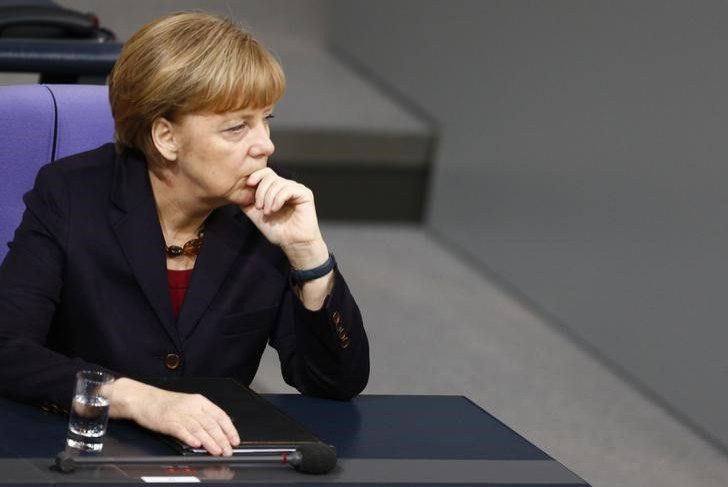Eurozone Deflation May Be The Final Push For European Central Bank Bond-Buying Plan

The eurozone’s dip into deflation has member countries leaning hard on the European Central Bank to roll out a bond-buying program to jolt the economy, an option that Germany has strongly opposed. But analysts say in light of the gloomy economic figures, the question now isn’t whether the ECB will take the leap – but how.
“I think it’s inevitable now,” said Alexander Privitera, director of the business and economics program at the American Institute for Contemporary German Studies at Johns Hopkins University. “[The ECB] can’t take any chances anymore. It wouldn’t make sense to wait forever.”
Official figures released Wednesday showed that prices in the eurozone fell by 0.2 percent in December compared with a year earlier, largely spurred by slumping oil prices. Pressure has been mounting on ECB President Mario Draghi for months to introduce a fresh round of quantitative easing – printing money to buy government bonds – and Draghi has indicated he might finally pull the trigger.
“The risk that we do not fulfill our mandate of price stability is higher than six months ago,” he told German newspaper Handelsblatt last week. “We are in technical preparations to adjust the size, speed and compositions of our measures in early 2015, should it become necessary to react to a too long period of low inflation.” With deflation now a reality, Draghi’s words are echoing louder than ever.
German officials have resisted a quantitative easing plan, saying that buying bonds from eurozone countries struggling with sovereign debt could disrupt structural reform measures, and warning of potential asset bubbles. But Privitera said Berlin would eventually give way.
“There will be loud, very vocal opposition from German backbenchers and politicians,” he said, but “in fact the Berlin government will tolerate it, despite their misgivings.”
Robert Kahn, senior fellow for international economics at the Council on Foreign Relations, agreed that the ECB would likely make the move. But he said German opposition could thwart the effectiveness of a bond-buying program.
“My concern is that the tiptoeing around German opposition will lead to [the ECB] doing it in a way that undermines the potential effectiveness of the program,” Kahn said. Being too cautious of German sensitivity, he said, could hamper the ECB’s ability to shore up confidence in the program from the rest of the eurozone. Communication is a “central part of what makes this powerful,” he added.
Analysts expect Draghi to announce a quantitative easing program at the ECB’s monetary policy meeting Jan. 22, although it’s unclear whether he will unveil details of the program then. Until then, there is still much debate over the central bank’s best options. The ECB could buy government bonds itself according to the proportion of each member state’s share in the central bank – which means it would buy bonds from Greece in addition to Germany. Other options include limiting its purchases to bonds with AAA or AA ratings, or leaving the purchasing decisions to each country’s respective central banks. But, Kahn said, "it's not just the purchases, it's the commitment to keep doing it" that will be a crucial part of the program's effectiveness.
But many analysts also doubt that a quantitative easing plan alone would reverse the eurozone’s economic fortunes into full recovery. “If you take [Japan’s] Abenomics as a sort of example that the ECB has watched with interest, you see that monetary policy alone will not do the trick,” Privitera said.
Meanwhile, speculation about Greece’s possible exit from the eurozone has rattled markets even further. Greece announced snap parliamentary elections for the end of January, and the potential election of the pro-exit Syriza party is reviving scenarios of a “Grexit” yet again. What’s more, German Chancellor Angela Merkel has reportedly indicated she would now be willing to let the Greeks leave.
But Privitera said Merkel’s shift in tack was mostly a political negotiating tactic. “Obviously the eurozone is better equipped now than it was two or three years ago, but doesn’t mean a Grexit would be painless,” he said. “It’s a lot of posturing. It doesn’t necessarily mean that the Germans are ready to drop Athens into the Mediterreanean Sea.”
Nevertheless, Kahn said a Syriza win could push Germany far enough to allow a Grexit. “The economic program that Syriza has presented is so unorthodox, so unrealistic and so oppositional to everything that the Germans believe in, that it’s hard to imagine that if [Syriza leader Alexis] Tsipras and Syriza are elected and go into government – I am hard-pressed to see that there really is common ground there,” he said. “There’s certainly a political element to [Germany’s response], but if we get there, the Germans will have to say, ‘I’m sorry, we can’t support this, and if you leave, so be it.’ ”
© Copyright IBTimes 2024. All rights reserved.






















